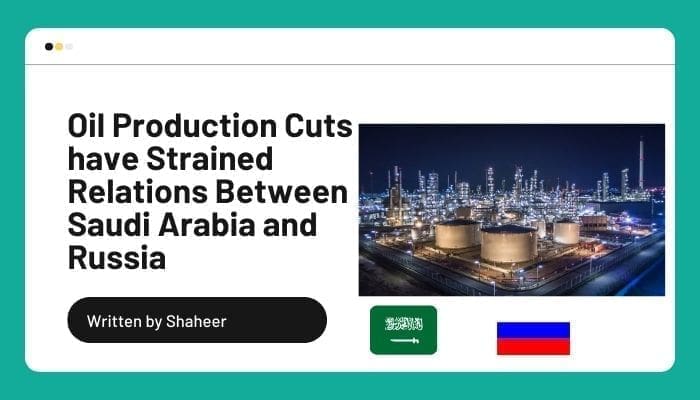Tensions between Saudi Arabia and Russia are building as Moscow continues to pour massive amounts of cheaper oil into the market, undercutting Riyadh’s efforts to raise energy prices, according to people familiar with the situation.

According to the people, Saudi Arabia, the de facto chairman of the Organization of Petroleum Exporting Countries, has conveyed its displeasure with Russia for failing to fully implement its vow to reduce output in response to Western sanctions.
According to the sources, Saudi authorities have complained to senior Russian officials and requested them to adhere to the agreed-upon cuts.
The tension between the world’s two largest oil producers is palpable ahead of a major meeting in Vienna on June 4 between members of OPEC and a group of Russia-led oil producers known as OPEC+. The cartel is due to vote on a production plan for the second half of the year, amid rising concerns that the global economy is weakening, reducing energy demand.
Earlier this week, Saudi Arabia’s energy minister issued a warning to oil speculators, hinting to the market that another production cut was on the table, amid concerns about the recent rise in short positions and Russia’s inability to achieve its voluntary limits. Meanwhile, Russian President Vladimir Putin stated that oil prices were approaching “economically justified” levels, implying that the group’s production policy may not need to be changed immediately.
The OPEC+ meeting comes after Saudi Arabia, Russia, and other OPEC+ members said in early April that they will decrease output in order to support oil prices. Riyadh began limiting output earlier this month. Moscow announced at the time that it would extend unilateral limitations that went into force in March until the end of the year.
According to the most recent available statistics, Russia continues to pour massive volumes of oil into the market, which has helped maximize income for its battered economy while adding to a global excess, according to industry experts and dealers.
Despite the Saudi-led intervention, oil prices are down around 10% from where they were in early April, and they are down significantly from the highs reached during Russia’s invasion of Ukraine earlier this year. Brent, the international oil contract, climbed 0.9% to $76.95 per barrel on Friday.
It is unclear whether Saudi Arabia will take any immediate move that will jeopardize the oil partnership with Russia. OPEC+ is no stranger to tensions between Riyadh and Moscow. Oil prices plummeted in March 2020 after Saudi Arabia and Russia failed to agree on an emergency plan to resolve a supply glut. Following the disagreement, Saudi Arabia launched a price war in an attempt to take market share from Russia.
Saudi Arabia and Russia are partners in an effort by oil producers to keep energy prices stable. The White House slammed the decision, saying it was foolish and that OPEC+ was deliberately helping Russia pay for its war in Ukraine.
Saudi Arabia invited Ukrainian President Volodymyr Zelensky as a special guest to the annual Arab League conference last week. The kingdom is one of the countries offering to mediate a peaceful resolution to the conflict. Last year, it assisted Russia and Ukraine in negotiating a high-profile prisoner swap and announced $400 million in humanitarian aid for Kyiv.
Saudi Arabia’s and Russia’s energy ministries did not reply to calls for comment.
Russian Deputy Prime Minister Alexander Novak said earlier this month that Moscow was following through on its voluntary vow to limit oil output by 500,000 barrels per day from March through the end of the year. After the Group of Seven imposed price limitations on Russian oil and oil products, Moscow announced a 5% reduction in output.
“Taking into account the unfounded speculation in the press regarding oil production levels,” Novak stated, “Russia reaffirms its full commitment to and implementation of voluntary oil production cut levels.”
It also pressured secondary sources this week to change their estimates of its oil production, but the agencies refused, according to these persons.
There is no obligation that Russia accurately report its output, but the mismatch adds to OPEC+ tensions over whether to limit output further.
Sanctions imposed by the West on Russian fossil fuels are hastening the shift in global energy flows, with China and India increasingly taking advantage of Russian oil discounts and Middle Eastern producers shifting their petroleum to Europe.
According to Vortexa, a data-commodity business, Russia eclipsed Saudi Arabia as China’s main oil supplier in March, while India’s imports of Russian oil surpassed combined flows from Saudi Arabia and Iraq for the first time ever last month.
According to Saudi officials and others familiar with Saudi oil strategy, Riyadh is under pressure to keep oil prices high, with its budget requiring an estimated $81 per barrel—about $5 more than current levels. The monarchy must fund vast development projects at home, some of which are so large that the Saudis refer to them as gigaprojects.
Saudi Crown Prince Mohammed bin Salman, the de facto Saudi ruler, is halfway through an ambitious plan to overhaul his country’s economy, rework its physical environment, and upend its conservative culture using his country’s gusher of oil riches. When oil prices reached $100 per barrel last year as a result of Russia’s invasion of Ukraine, the monarchy accelerated its efforts, which are mostly funded by Mohammed’s $650 billion sovereign-wealth fund.
Saudi economic experts have informally told senior policymakers in recent months that the kingdom requires higher oil prices for the next five years in order to continue spending billions of dollars on projects that have so far drawn little foreign investment.

